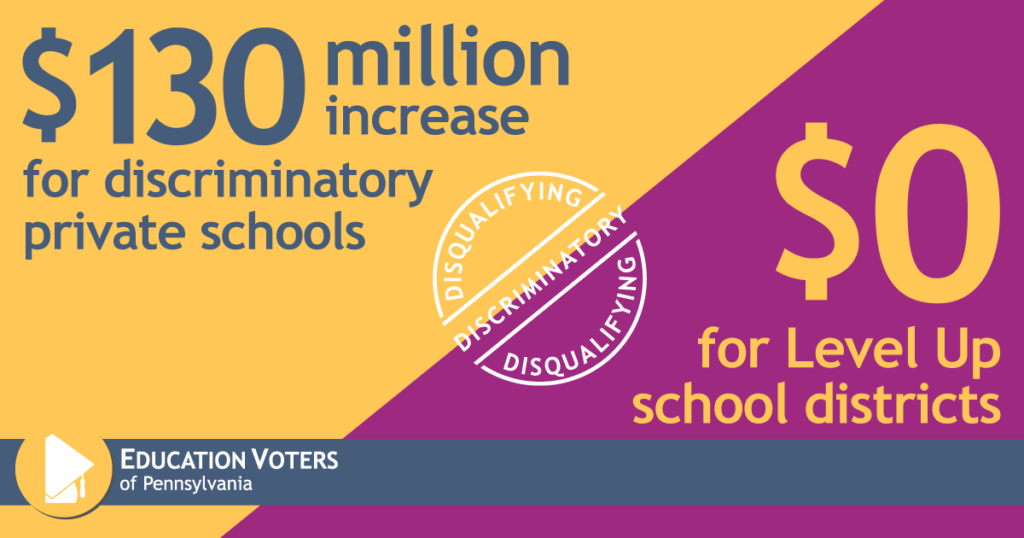Lawmakers ended a five-month budget stalemate on Wednesday (December 13th) when they passed code bills that finished up the 2023-2024 state budget. Below we look at the good, the bad, and the ugly for K-12 schools in the School Code, House Bill 301.
Please don’t be discouraged by The Ugly in this School Code. Remember that in June, House Democrats kept a new voucher program from being implemented in PA. A new voucher program like the Lifeline/PASS program that gives tax dollars directly to families is the holy grail of school privatizers and is the TOP priority of many PA lawmakers who support school privatization. With a divided legislature, there can unfortunately be a steep price to pay for standing up for what is right.
With the 2023-2024 state budget and all of the baggage that it carried finally behind us, we will start 2024 with a clean slate. And there will be new pressure on Governor Shapiro and state lawmakers to come to an agreement on how to comply with the court order to adequately fund all public schools. Because if they don’t, they will end up back in court.
In January all eyes will be on The Basic Education Funding Commission, which is scheduled to release its report on January 11th. Then we will await Governor Shapiro’s budget address on February 6th, where we will learn his priorities and his proposed funding plan for K-12 education. The New Year promises to be a busy one for all of us!
In the meantime, here is our rundown what was in the School Code for K-12 schools.
The Good
- $175 million in NEW funding will be directed to school construction and environmental repairs through a grant program.
- The $100 million grant program for school safety and mental health continues to be funded.
- $10 million in NEW funding will be allocated for the Educator Pipeline Support Grant Program that provides grants of $10,000 to student teachers, or $15,000 if the student teacher teaches in a school with high turnover. Pennsylvania faces an unprecedented teacher shortage; this investment will help students be able to afford to become teachers.
The Bad
Let’s just skip to the ugly.

The Ugly
- $0 was allocated to fund the Level Up supplement to support Pennsylvania’s poorest 100 school districts. You may remember that earlier this year when Democrats in the House refused to support the new Lifeline/PASS school voucher program, Republicans yanked their support for Level Up and students in Pennsylvania’s poorest school districts.
- $130 million in NEW funding was allocated to pay for private school vouchers through Pennsylvania’s unaccountable and discriminatory Educational Improvement Tax Credit (EITC) and Opportunity Scholarship Tax Credit (OSTC) programs. This brings the total funding for private and religious school vouchers in Pennsylvania to a whopping $470 million per year.*
The School Code includes minimal additional reporting requirements for EITC/OSTC scholarship organizations.
For each voucher given to an applicant, scholarship organizations will need to:
- Indicate if the student has a disability;
- Indicate if the student was in grades K-8 or 9-12; and
- Indicate the dollar amount of the voucher.
For each year a voucher was used they will need to report:
- The name of the applicant’s school district of residence and
- The name of the school entity that the applicant attends.
Conspicuously absent from reporting and accountability requirements for EITC and OSTC:
- Verification of family income levels;
- Reporting where the student went to school the year prior to receiving a voucher to show how many vouchers are simply going to students who are already attending a private school vs. how many new students are attending private/religious schools because of the vouchers; and
- The academic achievement of students in the voucher schools.
And, of course, there is nothing that addresses the issue of discrimination by private/religious schools that receive tax dollars.
The amount of funding that scholarship organizations are allowed to keep and spend as they please was reduced from 20% to 10%. This brings Pennsylvania more in line with other states with similar programs, but still allows scholarship organizations to keep $47 million every year with no requirement to share how they spend these tax dollars.
*Total funding for ALL EITC/OSTC programs is now up to $555 million, which includes $54.5 million in funding for Educational Improvement Organizations and $30.5 million for pre-k organizations. Ed Voters’ work focuses only on the $470 million in EITC/OSTC funding that is spent on vouchers for private and religious schools.

Recent Comments